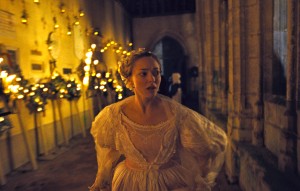The film version of Alan Boubil’s timeless musical classic “Les Miserables” opened Christmas day last year, featuring a hit cast of big Hollywood, as well as several notable breakout, actors. The film has earned over $350 million worldwide in the box offices and garnered eight Academy Award nominations and three wins.
While this hit film is the third highest earning musical movie ever made, following only “Grease” (1978) and “Chicago” (2002), musical movies are not a new thing. Some earlier plays adapted for the big screen include the 1965 classic “Sound of Music” and George Cukor’s 1964 musical film “My Fair Lady.”

Amy Camp, a graduate from Brigham Young University–Idaho, is a self-proclaimed music theater junkie. While there seems to be a growing trend toward turning musicals into movies, Camp said the interchange between Broadway and Hollywood is not new.
“Historically, there has been a great tie between movies and the stage,” Camp said. “There has always been a lovely relationship.”
In recent years, more film companies have been taking on the challenging task of adapting musical theater for film. Musicals first made popular on Broadway, such as “Mamma Mia,” “Evita” and “Sweeny Todd: The Demon Barber of Fleet Street,” have now graced the silver screen. While some adaptations have received mixed reviews from audience members, filmmakers continue to adapt musical productions for the screen.
“What is happening now with a lot of musicals is because musicals are so expensive to produce onstage, and when they are turned into movies, they already have a built-in audience,” Camp said. “If you look at a show like ‘Mary Poppins,’ so many people have seen it, so they’ll be more likely to see it in theaters.”
Camp, like many musical theater fans, said she thinks some movie adaptations of musicals are done better than others.
“It depends on the movie and how it is done,” Camp said. “For me, when it works is when they are true to the original.”
Despite some criticism from musical theater purists, there is no doubt that bringing stage productions allows for more intricate special effects and settings. Brianna Boyd, a sophomore studying theater education, said she thinks modern advancements in film production allow filmmakers to take classic musicals to another level.
“I think we live in a really cool time where we can make the original thoughts, ideas and concepts of musicals even grander and more available to broader audiences,” Boyd said.
Acting onstage and in front of camera both have their different limitations and strengths. Boyd said she loves watching film adaptations of popular Broadway musicals because of the little details you can’t portray in a stage production.
“It is different because the camera can catch those little tiny nuances and trains of thought on faces so it’s more intimate,” Boyd said. “You can have a closer relationship with the characters, whereas when you see the acting on stage, they have to make everything more direct and concrete.”
While adapting a musical for film may seem like a task much easier than creating a story from nothing, there are a lot of changes that go into turning a good work of theater into a good work of film. John Rapson, a graduate from the University of Michigan, is a cast member of the Les Miserables 25th Anniversary tour. Rapson said he believes good movie musicals don’t directly translate the musical into film.
“Turning musicals into movies is a tricky business,” Rapson said. “I think it’s at it’s absolute best when the filmmaker’s priority is to make an excellent film that can stand on its own. Things are written specifically for the stage for a reason. They have to evolve to become excellent films, and the best results come when directors and writers help foster that evolution.”
Although Rapson said there are many movie musicals he enjoys, he believes there is nothing that can equal an evening of live theater.
“Theater only happens once. No matter how many nights a production runs for, it is never going to be the same. Film is an equally brilliant art form, but in a totally different way in that it is permanent. They are two very different things, and I don’t worry that one will invade the other.”




